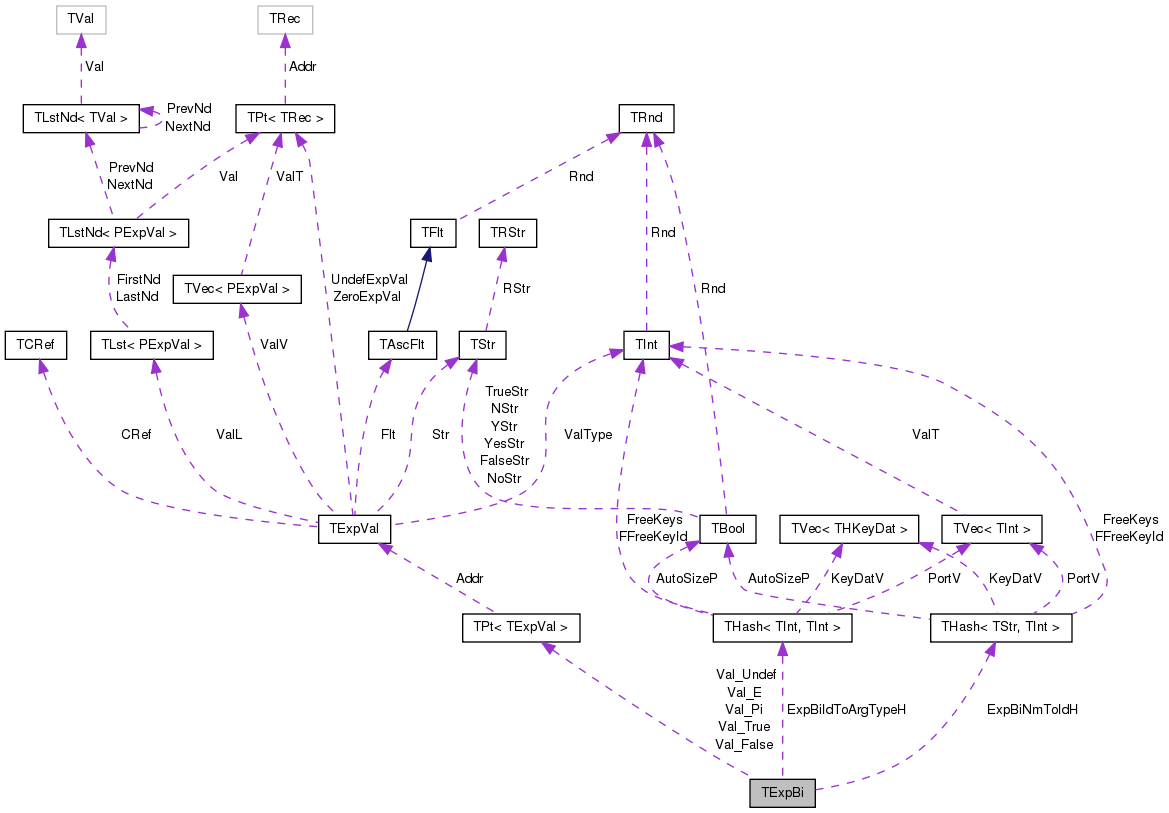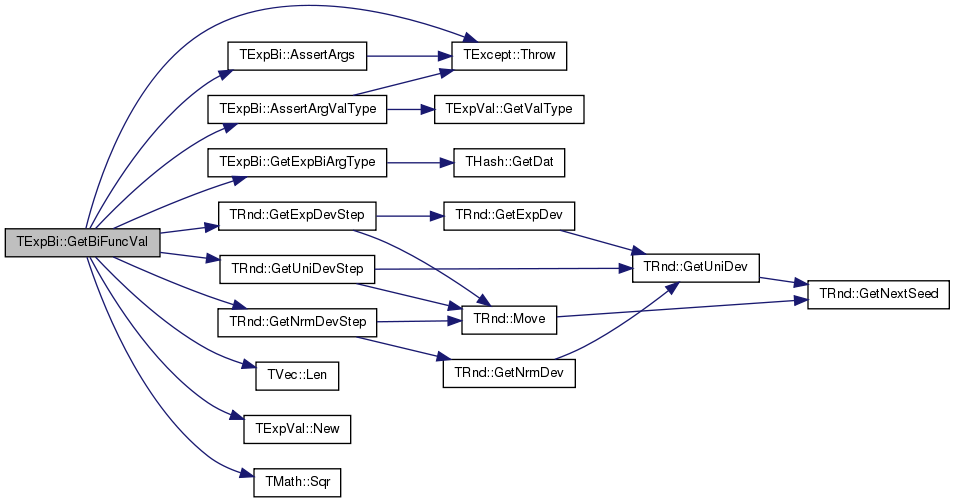|
SNAP Library , Developer Reference
2013-01-07 14:03:36
SNAP, a general purpose, high performance system for analysis and manipulation of large networks
|
|
SNAP Library , Developer Reference
2013-01-07 14:03:36
SNAP, a general purpose, high performance system for analysis and manipulation of large networks
|
#include <exp.h>

Public Member Functions | |
| TExpBi () | |
| TExpBi & | operator= (const TExpBi &) |
| bool | operator== (const TExpBi &) const |
| bool | IsExpBiId (const TStr &ExpBiNm, TExpBiId &ExpBiId) |
| bool | IsExpBiId (const TStr &ExpBiNm) |
| TExpBiArgType | GetExpBiArgType (const TExpBiId &ExpBiId) |
| void | AssertArgs (const int &RqArgs, const int &ActArgs) |
| void | AssertArgValType (const TExpValType &ExpValType, const PExpVal &ExpVal) |
| PExpVal | GetBiConstVal (const TExpBiId &ExpBiId) |
| PExpVal | GetBiFuncVal (const TExpBiId &ExpBiId, const TExpValV &ArgValV, const PExpEnv &ExpEnv) |
Private Member Functions | |
| void | AddBi (const TStr &ExpBiNm, const TExpBiId &ExpBiId, const TExpBiArgType &ExpBiArgType=ebatUndef) |
Private Attributes | |
| TStrIntH | ExpBiNmToIdH |
| TIntIntH | ExpBiIdToArgTypeH |
| PExpVal | Val_Undef |
| PExpVal | Val_True |
| PExpVal | Val_False |
| PExpVal | Val_E |
| PExpVal | Val_Pi |
| TExpBi::TExpBi | ( | ) |
Definition at line 183 of file exp.cpp.
References AddBi(), TMath::E, ebatFlt, ebatFltFlt, ebatVoid, ebi_Abs, ebi_ACos, ebi_ASin, ebi_ATan, ebi_BinDev, ebi_Ceil, ebi_Cos, ebi_CosH, ebi_E, ebi_Exp, ebi_ExpDev, ebi_False, ebi_Floor, ebi_Frac, ebi_GamDev, ebi_Int, ebi_Log, ebi_Log10, ebi_NrmDev, ebi_Pi, ebi_PoiDev, ebi_Pow, ebi_Sin, ebi_SinH, ebi_Sqr, ebi_Sqrt, ebi_Tan, ebi_TanH, ebi_True, ebi_Undef, ebi_UniDev, ebi_UniDevStep, TExpVal::GetUndefExpVal(), TExpVal::New(), TMath::Pi, Val_E, Val_False, Val_Pi, Val_True, and Val_Undef.
: ExpBiNmToIdH(100), ExpBiIdToArgTypeH(100){ // constants AddBi("Undef", ebi_Undef); AddBi("True", ebi_True); AddBi("False", ebi_False); AddBi("E", ebi_E); AddBi("Pi", ebi_Pi); // trigonometric funcions AddBi("Sin", ebi_Sin, ebatFlt); AddBi("Cos", ebi_Cos, ebatFlt); AddBi("Tan", ebi_Tan, ebatFlt); AddBi("ASin", ebi_ASin, ebatFlt); AddBi("ACos", ebi_ACos, ebatFlt); AddBi("ATan", ebi_ATan, ebatFlt); AddBi("SinH", ebi_SinH, ebatFlt); AddBi("CosH", ebi_CosH, ebatFlt); AddBi("TanH", ebi_TanH, ebatFlt); // exponential functions AddBi("Pow", ebi_Pow, ebatFltFlt); AddBi("Exp", ebi_Exp, ebatFlt); AddBi("Sqr", ebi_Sqr, ebatFlt); AddBi("Sqrt", ebi_Sqrt, ebatFlt); AddBi("Log", ebi_Log, ebatFlt); AddBi("Log10", ebi_Log10, ebatFlt); // number manipulation functions AddBi("Ceil", ebi_Ceil, ebatFlt); AddBi("Floor", ebi_Floor, ebatFlt); AddBi("Int", ebi_Int, ebatFlt); AddBi("Frac", ebi_Frac, ebatFlt); AddBi("Abs", ebi_Abs, ebatFlt); // random deviates AddBi("UniDev", ebi_UniDev, ebatVoid); AddBi("NrmDev", ebi_NrmDev, ebatVoid); AddBi("ExpDev", ebi_ExpDev, ebatVoid); AddBi("GamDev", ebi_GamDev, ebatFlt); AddBi("PoiDev", ebi_PoiDev, ebatFlt); AddBi("BinDev", ebi_BinDev, ebatFltFlt); AddBi("UniDevStep", ebi_UniDevStep, ebatFltFlt); // assign values to constants Val_Undef=TExpVal::GetUndefExpVal(); Val_True=TExpVal::New(double(1)); Val_False=TExpVal::New(double(0)); Val_E=TExpVal::New(TMath::E); Val_Pi=TExpVal::New(TMath::Pi); }

| void TExpBi::AddBi | ( | const TStr & | ExpBiNm, |
| const TExpBiId & | ExpBiId, | ||
| const TExpBiArgType & | ExpBiArgType = ebatUndef |
||
| ) | [private] |
Definition at line 235 of file exp.cpp.
References THash< TKey, TDat, THashFunc >::AddDat(), ExpBiIdToArgTypeH, ExpBiNmToIdH, and TStr::GetUc().
Referenced by TExpBi().
{
ExpBiNmToIdH.AddDat(ExpBiNm.GetUc(), TInt(int(ExpBiId)));
ExpBiIdToArgTypeH.AddDat(TInt(int(ExpBiId)), TInt(int(ExpBiArgType)));
}


| void TExpBi::AssertArgs | ( | const int & | RqArgs, |
| const int & | ActArgs | ||
| ) |
Definition at line 255 of file exp.cpp.
References TExcept::Throw().
Referenced by GetBiFuncVal().
{
if (RqArgs!=ActArgs){
TExcept::Throw("Invalid number of arguments.");
}
}


| void TExpBi::AssertArgValType | ( | const TExpValType & | ExpValType, |
| const PExpVal & | ExpVal | ||
| ) |
Definition at line 261 of file exp.cpp.
References TExpVal::GetValType(), and TExcept::Throw().
Referenced by GetBiFuncVal().
{
if (ExpValType!=ExpVal->GetValType()){
TExcept::Throw("Invalid type of argument.");
}
}


| PExpVal TExpBi::GetBiConstVal | ( | const TExpBiId & | ExpBiId | ) |
Definition at line 268 of file exp.cpp.
References ebi_E, ebi_False, ebi_Pi, ebi_True, ebi_Undef, TExcept::Throw(), Val_E, Val_False, Val_Pi, Val_True, and Val_Undef.
Referenced by TExp::EvalExp().
{
switch (ExpBiId){
case ebi_Undef: return Val_Undef;
case ebi_True: return Val_True;
case ebi_False: return Val_False;
case ebi_E: return Val_E;
case ebi_Pi: return Val_Pi;
default: TExcept::Throw("Invalid constant."); return Val_Undef;
}
}


| PExpVal TExpBi::GetBiFuncVal | ( | const TExpBiId & | ExpBiId, |
| const TExpValV & | ArgValV, | ||
| const PExpEnv & | ExpEnv | ||
| ) |
Definition at line 279 of file exp.cpp.
References AssertArgs(), AssertArgValType(), ebatFlt, ebatFltFlt, ebatUndef, ebatVoid, ebi_Abs, ebi_ACos, ebi_ASin, ebi_ATan, ebi_BinDev, ebi_Ceil, ebi_Cos, ebi_CosH, ebi_Exp, ebi_ExpDev, ebi_ExpDevStep, ebi_Floor, ebi_Frac, ebi_GamDev, ebi_Int, ebi_Log, ebi_Log10, ebi_NrmDev, ebi_NrmDevStep, ebi_PoiDev, ebi_Pow, ebi_Sin, ebi_SinH, ebi_Sqr, ebi_Sqrt, ebi_Tan, ebi_TanH, ebi_UniDev, ebi_UniDevStep, evtFlt, Fail, GetExpBiArgType(), TRnd::GetExpDevStep(), TRnd::GetNrmDevStep(), TRnd::GetUniDevStep(), TVec< TVal >::Len(), TExpVal::New(), TMath::Sqr(), and TExcept::Throw().
Referenced by TExp::EvalExp().
{
TExpBiArgType ExpBiArgType=TExpBi::GetExpBiArgType(ExpBiId);
int Args=ArgValV.Len();
double ArgFlt1=0; double ArgFlt2=0;
switch (ExpBiArgType){
case ebatUndef: Fail; break;
case ebatVoid:
AssertArgs(0, Args); break;
case ebatFlt:
AssertArgs(1, Args);
AssertArgValType(evtFlt, ArgValV[0]);
ArgFlt1=ArgValV[0]->GetFltVal(); break;
case ebatFltFlt:
AssertArgs(2, Args);
AssertArgValType(evtFlt, ArgValV[0]);
AssertArgValType(evtFlt, ArgValV[1]);
ArgFlt1=ArgValV[0]->GetFltVal();
ArgFlt2=ArgValV[1]->GetFltVal(); break;
default: Fail;
}
PExpVal ExpVal;
switch (ExpBiId){
// trigonometric funcions
case ebi_Sin: ExpVal=TExpVal::New(sin(ArgFlt1)); break;
case ebi_Cos: ExpVal=TExpVal::New(cos(ArgFlt1)); break;
case ebi_Tan: ExpVal=TExpVal::New(tan(ArgFlt1)); break;
case ebi_ASin: ExpVal=TExpVal::New(asin(ArgFlt1)); break;
case ebi_ACos: ExpVal=TExpVal::New(acos(ArgFlt1)); break;
case ebi_ATan: ExpVal=TExpVal::New(atan(ArgFlt1)); break;
case ebi_SinH: ExpVal=TExpVal::New(sinh(ArgFlt1)); break;
case ebi_CosH: ExpVal=TExpVal::New(cosh(ArgFlt1)); break;
case ebi_TanH: ExpVal=TExpVal::New(tanh(ArgFlt1)); break;
// exponential functions
case ebi_Pow: ExpVal=TExpVal::New(pow(ArgFlt1, ArgFlt2)); break;
case ebi_Exp: ExpVal=TExpVal::New(exp(ArgFlt1)); break;
case ebi_Sqr: ExpVal=TExpVal::New(TMath::Sqr(ArgFlt1)); break;
case ebi_Sqrt: ExpVal=TExpVal::New(sqrt(ArgFlt1)); break;
case ebi_Log: ExpVal=TExpVal::New(log(ArgFlt1)); break;
case ebi_Log10: ExpVal=TExpVal::New(log10(ArgFlt1)); break;
// number manipulation functions
case ebi_Ceil: ExpVal=TExpVal::New(ceil(ArgFlt1)); break;
case ebi_Floor: ExpVal=TExpVal::New(floor(ArgFlt1)); break;
case ebi_Int:{
double Int; modf(ArgFlt1, &Int);
ExpVal=TExpVal::New(Int); break;}
case ebi_Frac:{
double Frac, Int; Frac=modf(ArgFlt1, &Int);
ExpVal=TExpVal::New(Frac); break;}
case ebi_Abs: ExpVal=TExpVal::New(fabs(ArgFlt1)); break;
// random deviates
case ebi_UniDev: ExpVal=TExpVal::New(ExpEnv->GetRnd().GetUniDev()); break;
case ebi_NrmDev: ExpVal=TExpVal::New(ExpEnv->GetRnd().GetNrmDev()); break;
case ebi_ExpDev: ExpVal=TExpVal::New(ExpEnv->GetRnd().GetExpDev()); break;
case ebi_GamDev:{
int ArgInt1=int(ArgFlt1);
ExpVal=TExpVal::New(ExpEnv->GetRnd().GetGammaDev(ArgInt1)); break;}
case ebi_PoiDev:{
ExpVal=TExpVal::New(ExpEnv->GetRnd().GetPoissonDev(ArgFlt1)); break;}
case ebi_BinDev:{
int ArgInt2=int(ArgFlt2);
ExpVal=TExpVal::New(ExpEnv->GetRnd().GetBinomialDev(ArgFlt1, ArgInt2)); break;}
case ebi_UniDevStep:{
int ArgInt1=int(ArgFlt1); if (ArgInt1<0){ArgInt1=0;}
int ArgInt2=int(ArgFlt2);
ExpVal=TExpVal::New(TRnd::GetUniDevStep(ArgInt1, ArgInt2)); break;}
case ebi_NrmDevStep:{
int ArgInt1=int(ArgFlt1); if (ArgInt1<0){ArgInt1=0;}
int ArgInt2=int(ArgFlt2);
ExpVal=TExpVal::New(TRnd::GetNrmDevStep(ArgInt1, ArgInt2)); break;}
case ebi_ExpDevStep:{
int ArgInt1=int(ArgFlt1); if (ArgInt1<0){ArgInt1=0;}
int ArgInt2=int(ArgFlt2);
ExpVal=TExpVal::New(TRnd::GetExpDevStep(ArgInt1, ArgInt2)); break;}
default: TExcept::Throw("Invalid function.");
}
return ExpVal;
}


| TExpBiArgType TExpBi::GetExpBiArgType | ( | const TExpBiId & | ExpBiId | ) |
Definition at line 250 of file exp.cpp.
References ExpBiIdToArgTypeH, and THash< TKey, TDat, THashFunc >::GetDat().
Referenced by GetBiFuncVal().
{
TInt ExpBiArgType=ExpBiIdToArgTypeH.GetDat(TInt(int(ExpBiId)));
return TExpBiArgType(int(ExpBiArgType));
}


| bool TExpBi::IsExpBiId | ( | const TStr & | ExpBiNm, |
| TExpBiId & | ExpBiId | ||
| ) |
Definition at line 241 of file exp.cpp.
References ebi_Undef, ExpBiNmToIdH, TStr::GetUc(), and THash< TKey, TDat, THashFunc >::IsKey().
Referenced by IsExpBiId(), and TExp::TExp().
{
int ExpBiIdP;
if (ExpBiNmToIdH.IsKey(ExpBiNm.GetUc(), ExpBiIdP)){
ExpBiId=TExpBiId(int(ExpBiNmToIdH[ExpBiIdP])); return true;
} else {
ExpBiId=ebi_Undef; return false;
}
}


| bool TExpBi::IsExpBiId | ( | const TStr & | ExpBiNm | ) | [inline] |
Definition at line 154 of file exp.h.
References IsExpBiId().

| bool TExpBi::operator== | ( | const TExpBi & | ) | const [inline] |
TIntIntH TExpBi::ExpBiIdToArgTypeH [private] |
Definition at line 143 of file exp.h.
Referenced by AddBi(), and GetExpBiArgType().
TStrIntH TExpBi::ExpBiNmToIdH [private] |
Definition at line 142 of file exp.h.
Referenced by AddBi(), and IsExpBiId().
PExpVal TExpBi::Val_E [private] |
Definition at line 144 of file exp.h.
Referenced by GetBiConstVal(), and TExpBi().
PExpVal TExpBi::Val_False [private] |
Definition at line 144 of file exp.h.
Referenced by GetBiConstVal(), and TExpBi().
PExpVal TExpBi::Val_Pi [private] |
Definition at line 144 of file exp.h.
Referenced by GetBiConstVal(), and TExpBi().
PExpVal TExpBi::Val_True [private] |
Definition at line 144 of file exp.h.
Referenced by GetBiConstVal(), and TExpBi().
PExpVal TExpBi::Val_Undef [private] |
Definition at line 144 of file exp.h.
Referenced by GetBiConstVal(), and TExpBi().